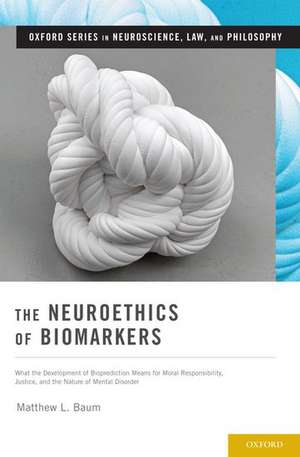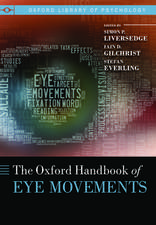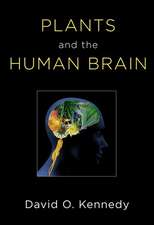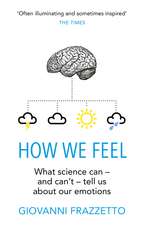The Neuroethics of Biomarkers: What the Development of Bioprediction Means for Moral Responsibility, Justice, and the Nature of Mental Disorder: Oxford Series in Neuroscience, Law, and Philosophy
Autor Matthew L. Baumen Limba Engleză Hardback – 7 apr 2016
Preț: 461.60 lei
Preț vechi: 637.91 lei
-28% Nou
Puncte Express: 692
Preț estimativ în valută:
88.33€ • 94.45$ • 73.65£
88.33€ • 94.45$ • 73.65£
Carte tipărită la comandă
Livrare economică 07-12 aprilie
Preluare comenzi: 021 569.72.76
Specificații
ISBN-13: 9780190236267
ISBN-10: 0190236264
Pagini: 224
Ilustrații: 1
Dimensiuni: 157 x 236 x 20 mm
Greutate: 0.5 kg
Editura: Oxford University Press
Colecția OUP USA
Seria Oxford Series in Neuroscience, Law, and Philosophy
Locul publicării:New York, United States
ISBN-10: 0190236264
Pagini: 224
Ilustrații: 1
Dimensiuni: 157 x 236 x 20 mm
Greutate: 0.5 kg
Editura: Oxford University Press
Colecția OUP USA
Seria Oxford Series in Neuroscience, Law, and Philosophy
Locul publicării:New York, United States
Recenzii
Our society is only beginning to come to grips with the profound implications of using biomarkers as imperfect 'crystal balls' for predicting the development of neurological and psychiatric disease. Dr. Baum's book is an essential guide to the scientific foundations of these tools and the difficult ethical questions that they raise about moral responsibility and priority setting
An exciting and comprehensive look at an important topic. Sure to be of interest to scientists and bioethicists working in the area.
An exciting and comprehensive look at an important topic. Sure to be of interest to scientists and bioethicists working in the area.
Notă biografică
Matthew L. Baum, DPhil, is an MD-PhD trainee at Harvard & MIT within the Division of Health Sciences & Technology and the Harvard Program in Neuroscience. He earned a DPhil from Oxford via his work at the Oxford Centre for Neuroethics and the Ethox Center as a Rhodes Scholar. He holds an MSc in Neuroscience from Trinity College Dublin, where he studied as a Mitchell Scholar. He has also served as the student/post-doc representative to the board of the International Neuroethics Society.



















